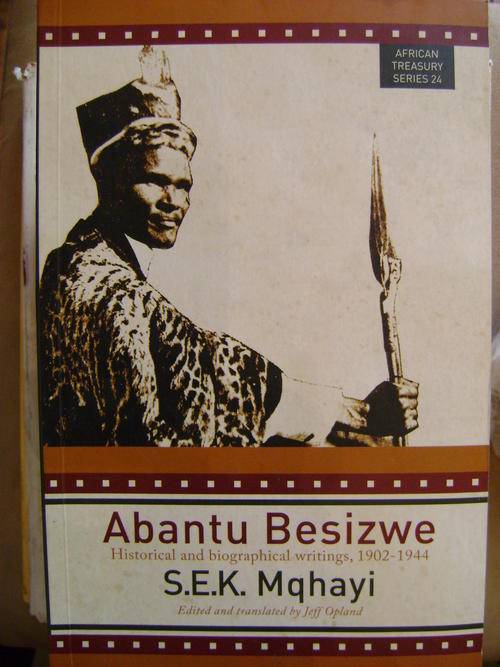Abantu Besizwe Historical and biographical writings, 1902-1944 - S.E.K. Mqhayi - Edited and translated by Jeff Opland - Wits University Press - 2009, first print - 624pp, indexed - Paperback as new. Postage R45.00
Samuel Edward Krune Mqhayi (1875–1945) was born in the Eastern Cape. He was educated formally at Lovedale, but absorbed the traditions of his people under his grandfather's uncle Nzanzana in rural Centane. Under the patronage of Walter Benson Rubusana, he taught in and near East London, and at Lovedale, and helped to edit two local newspapers, Izwi labantu and Imvo zabantsundu before retiring to devote himself to social upliftment schemes, to writing and translating. Prominent in literary, educational and political circles, Mqhayi was familiar with many of the leading African intellectuals of the previous generation. S E K. Mqhayi is one of the figures in the history of South African literature, yet his achievement is not fully appreciated because he wrote only in isiXhosa. He was the greatest of all isiXhosa praise poets, whose concern with all the people of South Africa earned him the title Imbongi yesizwe jikelele, ‘The poet of the whole nation’. A few of his published works are among the most popular in the isiXhosa language, yet many more are out of print, obscure, unpublished or lost. Abantu Besizwe, The nation’s people, the first new volume of Mqhayi’s writing to appear in over sixty years, is the twenty-third volume in Wits University Press’s African Treasury Series. It contains sixty-nine historical and biographical essays contributed to newspapers between 1902 and 1944 as originally published, with facing English translations. The essays, many of them enhanced by Mqhayi’s incomparable poetry, present South African personalities and events ranging from the early nineteenth to the mid twentieth century, recording climactic battles and intimate conversations, the growth of national movements and the lives of lifelong friends. Here you will find Mqhayi's humane and incisive portraits of men and women, royalty and commoners, the great and the obscure, black and white, isiXhosa, isiZulu, Sesotho and Setswana. This collection of largely unrecognised material will necessitate a reassessment of the history of the isiXhosa-speaking peoples, establish Mqhayi's reputation as a significant South African historian, and confirm his status as a major South African author.
